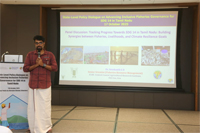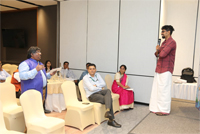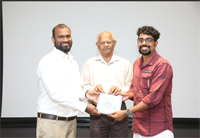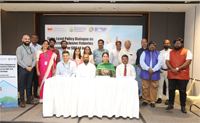
State-Level Policy Dialogue on Advancing Inclusive Fisheries Governance for SDG 14 in Tamil Nadu
State-Level Policy Dialogue on Advancing Inclusive Fisheries Governance for SDG 14 in Tamil Nadu
ICAR-CCARI participated in the State-Level Policy Dialogue on Advancing Inclusive Fisheries Governance for SDG 14 in Tamil Nadu organized by TERI, in association with Govt. of Tamil Nadu, Ministry of Earth Sciences, Bay of Bengal Programme (BOBP) and Environmental Defense India Foundation at Chennai on 17 October, 2025. The inaugural session of the programme was blessed with the presence of Ms. Sudha S, IFS, Member Secretary, State Planning Commission, Govt. of Tamil Nadu; Dr. P. Krishnan, Director, BOBP-IGO; Dr. D. Vijai, Senior Manager, Environmental Defense India Foundation (EDIF); Dr. Raghab Ray, Area Convener, Fellow, TERI-Goa; and Smt. Asha Hadkar, Fellow, TERI Goa. About 15 officials from research institutes, line departments, and NGOs participated in the programme. During her address, Ms. Sudha, IFS informed about the sustainable fisheries initiatives in the state of Tamil Nadu and the progress of the state towards SDG 14 goals by 2030. Dr P. Krishnan, Director, BOBP highlighted the holistic fisheries management framework for the state of Tamil Nadu and the documentation of data and reporting system for SDG 14 goals to the FAO following the bottom-up approach. Four panel discussions were conducted on different themes to gather policy inputs from the participants. Dr. Sreekanth G.B., Senior Scientist (FRM) at ICAR-CCARI, led the panel on “Tracking Progress Towards SDG 14 in Tamil Nadu: Building Synergies between Fisheries, Livelihoods, and Climate Resilience Goals,” where he addressed key topics including 1) key barriers preventing effective integration of fisheries management, livelihood support, and climate resilience, 2) empowerment of coastal communities to participate in decision-making process, 3) role of technology in monitoring fisheries and coastal ecosystem health, 4) partnership between government, academia, and civil society, and 5) financial instruments, such as insurance schemes. Participants shared their feedback and suggestions across all panel discussions, and the compiled recommendations will be developed into a policy paper for submission to the State.



